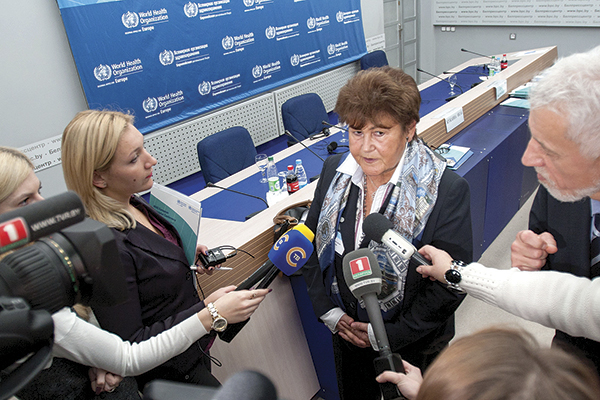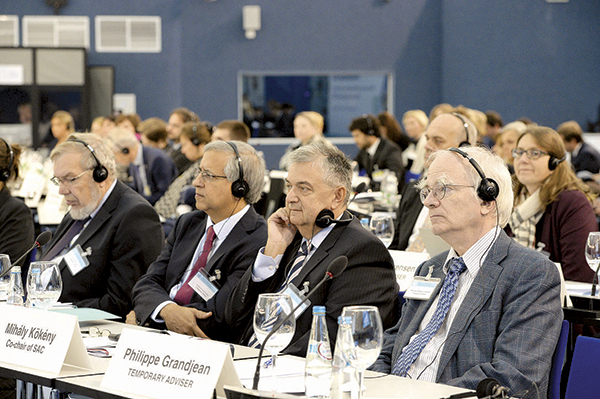
The President of Belarus met foreign guests at the event in Minsk, which was the first top-level medical forum for the capital, in terms of geography and number of participants. Around 200 VIP guests travelled from over 30 countries to come to Belarus. On the eve of the conference, Alexander Lukashenko met the WHO Regional Director for Europe, Zsuzsanna Jakab, who noted great interest in Belarusian achievements in the field of healthcare. She believes that these are gaining a global reputation among foreign specialists, who are keen to tour centres and clinics.
The Health-2020 strategy (developed in 2012) envisages investments into health at all stages of life, from birth. It aims to strengthen the healthcare system and to ensure accessibility to all layers of society. In this respect, our country can act as an example. Some time ago, the situation was different, since the early years of independence saw Belarus facing serious difficulties. Hospitals and polyclinics lacked medicines, qualified staff and finances. It was a challenge to persuade qualified medical professionals to move to the regions, and the situation was especially acute in rural areas.
As a result, the birth rate fell and mortality figures rose. However, unlike other post-Soviet republics, Belarus did not pursue a path of market reform, focusing on giving ordinary people equal access to medical services. “In Belarus, people are not left dying by the roadside if they have no insurance. We treat everyone,” Mr. Lukashenko stresses.
The country spends a great deal on health care; last year, almost 6 percent of its GDP. In addition, sponsors also make significant financial contributions. Over the past five years, over 130 medical sites have launched, and 17 Republican scientific-practical centres operate, worthily rivalling foreign institutions. Our doctors can perform the most complicated operations — including in the field of cardio-surgery and organ and tissue transplantation.
Gradual modernisation has been evident, as has the construction of new sites and the use of the latest high-tech equipment, producing significant results. Even most advanced states envy us in this respect. Belarus is among the top five countries for low infant and maternal mortality — behind Germany, the Netherlands, France and Switzerland. This year, not a single case of maternal mortality has been registered so far.

The Director of the World Health’s Organisation’s Regional Office for Europe answers the journalists’ questions
As regards tuberculosis, Belarus is ahead of Finland, Switzerland, Austria and Norway. Meanwhile, our country ensures the same access to medical services as Canada. The country has almost closed the ‘demographic scissors’. Since 2006, our birth rate has risen to 12.5 per capita, with a steadily falling mortality coefficient and production of new medicines.
Of course, health care responsibility is of primary importance, and Belarus is working to overcome the ill effects of smoking, alcohol and drug abuse, hypodynamia and non-balanced nutrition. Mr. Lukashenko believes the nation’s health directly depends on the level of our physical culture development and has set ambitious tasks. He stresses, “We need to ensure that up to 40 percent of the population take part in sports. A healthy lifestyle will become Belarus’ calling card.”
Truly, the nation’s health is not just a social imperative but affects our demographic and economic security. With this in mind, Belarus fully supports WHO initiatives. Our success within the Health-2020 programme is globally acknowledged.
It was interesting to find out conference participants’ impressions. Latvia’s Health Minister, Guntis Belevics, commented, “We originate from a single country but chose different paths after its collapse. In 2008, the crisis broke and we had to sharply cut our health care expenditure. We’re yet to restore the previous level, with Latvia allocating half the amount that Belarus does. Our people have to pay for a great deal themselves and we only produce five percent of our own medicines, having to import the rest. Meanwhile, you’ve increased your own production to 51 percent. Belarus should be rightly proud.”
Helsinki University Professor Ever Karienti added, “Health care in Belarus and Finland hardly differs. Probably, we have more experience in developing some medical services. However, as regards key indicators, you’ve been productive. Belarus stands well within the international arena, as can be confirmed by any foreign expert.”
The Minsk event allowed discussion of new ideas and developments with European colleagues. A co-ordinated approach has been laid out within the Minsk Declaration: to become an important instrument in realising the Health-2020 European policy.
As to why Minsk was chosen to promote such a global idea. The Director of the World Health Organisation’s Regional Office for Europe, Zsuzsanna Jakab, admits that the achievements of Belarusian medicine, especially in recent years, have played a decisive role. She explains, “What remains a dream for many countries is already a reality for you. I refer to the high availability of medical services and very low maternal and infant death rates, as well as immunization figures, which are among the best in Europe. You should share your experience, as many states are keen to learn from your achievements.”

International experts of the highest level have shown their eagerness to visit: last year, according to Ms. Jakab, Belarus became the first country to demonstrate its healthcare opportunities to specialists from the WHO and the UN. Their recommendations are already being launched into practice.
The WHO has been citing Belarusian medicine as an example to others, since we are an example within the CIS in most every way regarding healthcare. Even some highly-developed EU states do not surpass us.
In terms of child mortality and TB prevalence, we’re ahead of Switzerland, and are unrivalled within the CIS in terms of reducing the spread of HIV / AIDS and the coverage of antiretroviral therapy, as well as developments in maternity and childhood protection and transplantology.
Interest in the Belarusian model of healthcare was so great among delegates at the conference that tours were offered of any facility.
The leadership of WHO’s Regional Office for Europe chose to tour the Republican Scientific and Practical Centre of Oncology and Medical Radiology (named after N.N. Alexandrov) which recently opened Eastern Europe’s largest PET-centre.
Some might argue that we are limited in how far we can improve health since negative factors in the womb, and then in childhood, affect the brain and our DNA, marking us for future disease. What role does a happy childhood play? Or maternal well-being during pregnancy? How important is the feeling of control over one’s own life? Such issues all came under discussion by European medical experts.
The UK’s Sure Start children’s centres help women from ‘problem’ families while Ireland focuses on positive ageing via its Age-Friendly Cities and Counties programme. Meanwhile, Belarus is keen to promote the global initiative of breast feeding: to help prevent childhood obesity, heart problems, diabetes, and allergies and to enhance intellectual abilities. It is one of WHO’s Health-2020 initiative.
By Alexander Pimenov
Photo by BELTA
Photo by BELTA











